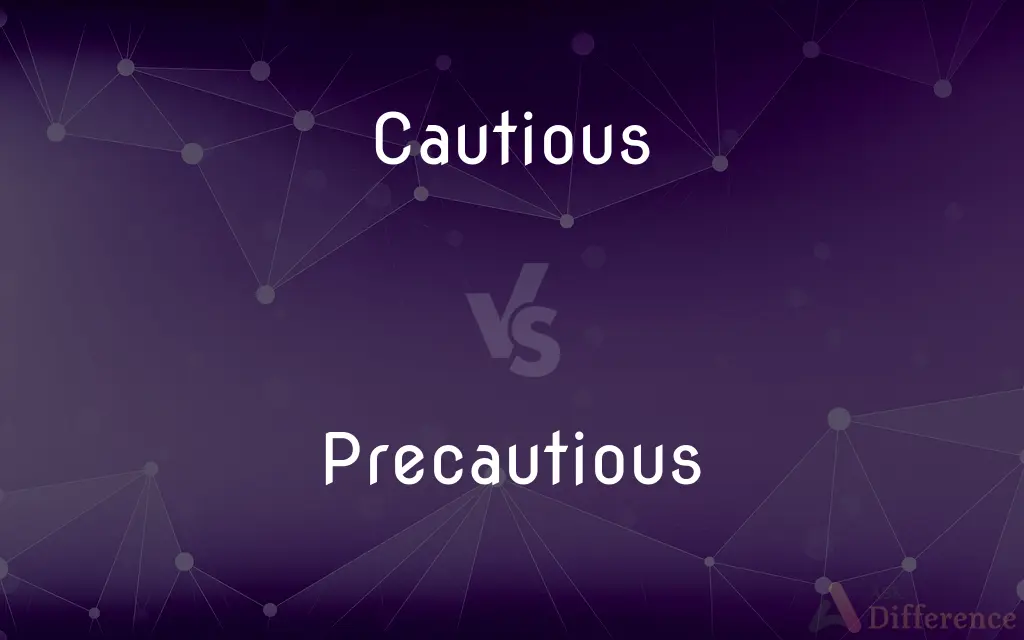Cautious vs. Precautious — What's the Difference?
Edited by Tayyaba Rehman — By Maham Liaqat — Updated on April 29, 2024
Cautious describes being careful to avoid risks, whereas precautious refers to taking actions in advance to prevent possible dangers.

Difference Between Cautious and Precautious
Table of Contents
ADVERTISEMENT
Key Differences
Cautious behavior typically involves a thoughtful approach to situations, considering potential risks before acting. On the other hand, precautious actions are characterized by taking preventive measures before a specific risk is immediately apparent.
A cautious person evaluates the current circumstances to decide on the safest course of action. In contrast, someone who is precautious often anticipates problems and implements solutions before any threat becomes evident.
Cautiousness is a reactive quality, where the level of caution applied is often proportional to the perceived risk. Conversely, precautious behavior is proactive, seeking to mitigate risks before they materialize.
Being cautious can be seen as a general personality trait that influences day-to-day decisions. Whereas, being precautious might involve specific, often strategic, preparations for particular scenarios.
While cautious individuals might avoid taking unnecessary risks, those who are precautious prepare extensively to ensure they are ready for potential dangers, regardless of the likelihood of those risks.
ADVERTISEMENT
Comparison Chart
Definition
Being careful to avoid potential risks
Taking steps in advance to prevent possible dangers
Nature
Reactive
Proactive
Trigger
Presence of immediate risk
Anticipation of possible risks
Behavior Pattern
Considers actions based on current situations
Plans and prepares ahead of potential issues
Typical Scenario
Deciding cautiously in a risky situation
Implementing safety measures before a risk is clear
Compare with Definitions
Cautious
Involving or exercising caution; prudent.
He made a cautious decision regarding the investment.
Precautious
Relating to the avoidance of potential danger by careful planning.
Their precautious route avoided known traffic issues.
Cautious
Guarded in actions or demeanor.
The cautious cat slowly approached the new toy.
Precautious
Taking measures to guard against something; preventative.
Precautious measures were taken to avoid the spread of the illness.
Cautious
Characterized by tentative actions or statements.
Her cautious approach to the proposal was well-received.
Precautious
Acting beforehand to prevent harm or secure good.
She installed smoke alarms as a precautious step.
Cautious
Reluctant to take risks.
His cautious nature often kept him from spontaneous adventures.
Precautious
Characterized by forward-thinking to avert potential problems.
His precautious planning saved the company during the crisis.
Cautious
Careful to avoid potential problems or dangers.
She was cautious when crossing the busy street.
Precautious
Involving or characterized by prudent foresight.
Precautious savings helped them during hard times.
Cautious
Showing or practicing caution; careful.
Precautious
Cautious, careful; characterized by taking precautions.
Cautious
Tentative or restrained; guarded
Felt a cautious optimism that the offer would be accepted.
Precautious
Taking precautions.
Cautious
Using or exercising caution; careful; tentative
He took a few cautious steps toward the cave.
Precautious
Taking or using precaution; precautionary.
Cautious
Attentive to examine probable effects and consequences of acts with a view to avoid danger or misfortune; prudent; circumspect; wary; watchful; as, a cautious general.
Cautious feeling for another's pain.
Be swift to hear; but cautious of your tongue.
Cautious
People who are fearful and cautious;
Whitewater rafting is not for the timid
Cautious
Showing careful forethought;
Reserved and cautious; never making swift decisions
A cautious driver
Cautious
Avoiding excess;
A conservative estimate
Cautious
Cautious in attitude and careful in actions; prudent;
A cautious answer
Very cautious about believing everything she was told
Cautious
Unwilling to take risks
Common Curiosities
What is the primary difference between cautious and precautious?
Cautious behavior is about being careful in present situations, while precautious involves taking steps ahead of time to prevent potential issues.
Which approach is considered more proactive, cautious or precautious?
Precautious is more proactive as it involves planning and taking steps before potential problems arise.
Can someone be both cautious and precautious?
Yes, an individual can exhibit both traits by being careful in current circumstances and also planning ahead to mitigate future risks.
How does precautious behavior relate to risk management?
Precautious behavior is a form of risk management that involves anticipating and preparing for potential dangers.
Is being precautious always better than being cautious?
Not necessarily; the suitability depends on the context. Precautious might be better for long-term planning, whereas cautious is ideal for immediate decision-making.
What are examples of precautious measures in everyday life?
Installing fire alarms, getting vaccinations, and saving money for emergencies are all examples of precautious measures.
Does a cautious person avoid all forms of risk?
Not all, but cautious people tend to avoid unnecessary or high risks whenever possible.
Can cautiousness prevent all risks?
No, cautiousness can minimize but not eliminate all risks, as it is limited to reacting to present conditions.
Is precautious behavior cost-effective?
It can be, as preventing issues often costs less than dealing with them after they occur, but initial investments may be higher.
How does being cautious affect decision-making?
Being cautious leads to more considered and potentially slower decision-making processes, focusing on minimizing risk.
Share Your Discovery

Previous Comparison
Defend vs. Protect
Next Comparison
Weak vs. FeebleAuthor Spotlight
Written by
Maham LiaqatEdited by
Tayyaba RehmanTayyaba Rehman is a distinguished writer, currently serving as a primary contributor to askdifference.com. As a researcher in semantics and etymology, Tayyaba's passion for the complexity of languages and their distinctions has found a perfect home on the platform. Tayyaba delves into the intricacies of language, distinguishing between commonly confused words and phrases, thereby providing clarity for readers worldwide.















































